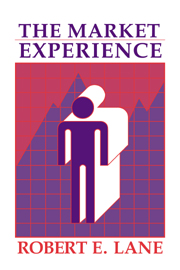Book contents
- Frontmatter
- Contents
- Acknowledgments
- Part I Introduction
- Part II Cognition and emotion
- 3 The costs of rationality
- 4 Affect, cognition, and well-being in a market economy
- 5 Money and cognitive complexity
- 6 Money symbolism and economic rationality
- 7 Economic and cognitive development in a market society
- 8 Environmental complexity and cognitive complexity
- Part III Self-attribution and self-esteem
- Part IV Human relations
- Part V Work
- Part VI Rewards
- Part VII Utility and happiness
- Part VIII Conclusion
- Author index
- Subject index
4 - Affect, cognition, and well-being in a market economy
Published online by Cambridge University Press: 18 December 2009
- Frontmatter
- Contents
- Acknowledgments
- Part I Introduction
- Part II Cognition and emotion
- 3 The costs of rationality
- 4 Affect, cognition, and well-being in a market economy
- 5 Money and cognitive complexity
- 6 Money symbolism and economic rationality
- 7 Economic and cognitive development in a market society
- 8 Environmental complexity and cognitive complexity
- Part III Self-attribution and self-esteem
- Part IV Human relations
- Part V Work
- Part VI Rewards
- Part VII Utility and happiness
- Part VIII Conclusion
- Author index
- Subject index
Summary
The concept of market rationality discussed in the previous chapter assumes a kind of emotional neutrality (except for the anemic schedule of preferences) that is totally unrealistic. In the following discussion we turn first to the central role of emotions in the market economy and then to certain ways in which affect (emotions) and cognition influence each other, as when cognitive processes are called upon to define arousal or when, in reverse, a positivity bias changes perception. Research on emotions greatly alters our understanding of market satisfactions or utility. We then turn to the effects on emotions of market success and failure, followed by a discussion of the effects of good mood on market work and thought. The chapter concludes with a discussion of the relation between happiness and cognition, including speculation on whether rationality is really compatible with happiness, which is the ultimate maximization of utility.
Markets as theaters of emotion
If it be agreed that the theory of market rationality as an approximation to economic behavior is a mischievous fiction, what is to take its place? Some combination of emotion and cognition, no doubt, but the relation between these two is complex. We turn here to a few of the market relevant aspects of this relationship.
Affect and arousal are the most encompassing of the terms dealing with this general area; emotions refer to something more specific, like fear, or pity; mood refers to an affect without specific target. The market stimulates arousal and is saturated with emotion: pride and shame and guilt (the three emotions that are identity related); anger and aggression; self-love, the foundation emotion, as Adam Smith pointed out.
- Type
- Chapter
- Information
- The Market Experience , pp. 58 - 78Publisher: Cambridge University PressPrint publication year: 1991

